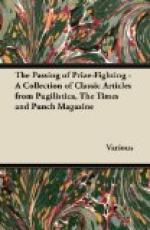Mr. WELLS, while he struck and maintained a jubilant note throughout his eloquent speech, tempered enthusiasm with caution. The Grecians, he said, like the Greeks, were wily folk and capable of shamming dead while they were all the while scheming and plotting to restore their imperilled supremacy. Indeed he knew it as a fact that some of the most infatuated scholars actually voted against compulsion, simply to confuse the issue. Still, for the moment it was a great victory, a crushing blow to Oxford, the stronghold of mediaevalism, incompetence and Hanoverianism, and an immense relief to the sorely-tried physique of the nation. For he was able to assure them, speaking with the authority of one who had taken first-class honours in Zoology, that the study of Greek more than anything else predisposed people to influenza by promoting cachexia, often leading to arterio-sclerosis, bombination of the tympanum, and even astigmatism of the pineal gland. (Sensation.)
Mr. PEMBERTON BILLING, M.P., speaking from the seat of an aeroplane, said that he had found the little Greek he remembered from his school-days not only no help but a positive hindrance to his advocacy of a strong Air policy. The efforts of the Greeks as pioneers of aviation were grossly exaggerated and, speaking as an expert, he denounced these literary fictions as so much hot air. There were at least forty-seven thousand reasons against Greek, but he would be content with two. It didn’t pay, and it was much harder than Esperanto.
Mr. WILLIAM LE QUEUX in a most impressive speech said that he was no enemy of ancient learning. Egyptology was only a less favourite recreation with him than revolver practice. But Greek he could never abide, and he was confirmed in his instinct by the fact that at all the sixteen Courts where he had been received and decorated Classical Greek was practically unknown. It was the same in his travels in Morocco, Algeria, Kabylia, among the Touaregs, the Senussis and the pygmies of the Aruwhimi Hinterland. He never heard it even alluded to. Nor had he found it necessary for his investigations into the secret service of Foreign Powers, the writing of spy stories, the forecasting of the Great War or the composition of cinema plays. He had done his best to procure the prohibition of the study of Greek in the Republic of San Marino, and he was inclined to trace the present financial crisis in that State to his failure. (Cheers.)
Mr. BERNARD SHAW struck a somewhat jarring note by the cynical remark that it would be a very good thing for modern sensational authors if Greek literature were not only neglected but destroyed, as some of the Classical authors had been guilty of prospective plagiarism on a large scale. He knew this as a fact, as he had been recently reading LUCIAN in a crib and found him devilish amusing. (Uproar and cries of “Shame!”)
A moving letter was read from Lord BEAVERBROOK, in which the great financier declared that, in arriving at the peerage at the age of thirty-seven, he had found his inability to read HOMER freely in the original no handicap or hindrance. He pointed out the interesting fact that Lord NORTHCLIFFE, who reached a similar elevation at the age of forty, had never composed any Greek iambics, though his literary style was singularly polished.




